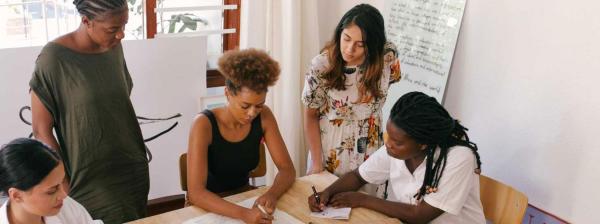In general, coming home from working abroad—whether it was a three-month or year-long experience—is always an adjustment. You may have had the best experience of your life and living at home just doesn’t measure up. You might be missing new friends or feel like you left behind some unfinished business. Or, you may feel blessed to be in a home with hot water, familiar tastes and the comfort of your own bed.
Depending on the experience, coming home can also feel like failure.
After my latest volunteer experience, coming home early felt like my only option. Now back in Canada, I am taking a moment—for what feels like the hundredth time—to assess the experience and re-think my commitment to the field of international development.
I have now realized that while I will never regret any of my opportunities to travel, learn a new language and make amazing friends, not every placement abroad is created equal.
At the beginning of last year, I had a graduated from a post-grad in international project management, completed two internships in South Africa and Indonesia, and volunteered for a short-term project in Mexico. Though I felt like I had a lot of experience, I thought it was time for a long-term placement to contribute my skills and focus on sustainable development and gender research.
I applied to volunteer in South America as a gender advisor and got a call that I had been accepted. Except, instead of gender, I had been selected to work in marketing and organizational strengthening, in a different country, in a completely different context.
Immediately, I was wary of the suggested placement. I didn’t feel like I had enough experience and worried that my Spanish language skills were not up to par for this particular position. I voiced my concerns, but my interviewers assured me that I would learn on the job and that I would be able to work with the local host organization to assess their needs and figure out ways to address them.
Rather than listening to my gut, I thought about how badly I needed the field work experience on my resume to further my career in international development. So, two months later, I was on a plane headed to Bolivia.
Rather than listening to my gut, I thought about how badly I needed the work experience on my resume to further my career in international development.
Having worked abroad previously, I know that working cross-culturally means that some things take longer periods of time and that there are unpredictable obstacles. Upon arrival, however, it became clearer with each conversation that no one was sure what my tasks would be, what the host organization wanted and needed, or even what team I should work with and how. I proposed ideas and scheduled discussions, but nearly every suggestion was met with feigned interest, and every meeting was either cancelled or moved.
I truly felt under-utilized. Within a month, I began to question my presence. I emailed with my Canadian host organization and met with their representative in Bolivia to discuss my concerns—including that the local organization did not seem to need me as much as was implied. In response, I was told to try harder, find more tasks to do and work on other projects like social media and website development; activities that I had limited experience with, and things I wasn't eager to do in a foreign language.
After three months, I felt no closer to my goals. I wasn’t furthering my skills in international development or truly helping my partner organization. While I created marketing manuals for future application, most of my ideas or initiatives could not be implemented due to lack of funds or staff resources. My emails were not often answered and my manuals were not circulated or fully read.
I raised my concerns again and we agreed that I and another volunteer could work on the creation of a gender committee instead. This would utilize my skills and achieve an organizational goal. Together we called meetings, created presentations, disseminated information and assigned homework and tasks. After three sessions, committee attendance dwindled to half and the Canadian host organization and I started to consider pulling our involvement in the committee.
As each day passed, I thought about how I had travelled far from home, raised money through the generosity of friends and former colleagues, committed my time and energy, as well as given up making decent money at home for this placement. I could no longer justify it. After seven long months, it was time to go home.
Now back in Canada, I’m regrouping and figuring out where everything went wrong and how I could prevent feeling this way in the future. Thinking back to the interview process, I started to remember how I had ignored the feeling that something wasn’t right and how I had let myself become convinced that things would work out upon arrival.
After taking time to think it through, here are my tips to avoid finding yourself in a similar situation:
Always follow your gut.
Researching the organization, country of destination, and local partner is not enough. Stories from previous volunteers are not enough. I did all that, and more, and still left feeling unsatisfied.
Equally, if not more, important, is to manage your expectations and decide what you are looking to gain from the experience. Again, follow your gut and ask yourself why you are taking part in a particular placement and what you hope to gain. The field of international development may be based on altruism, but the reality is that unless you want to commit your life to a cause, placements of one year or less are generally more about your personal and professional development than they are about the community you are sent to serve.
If you're a skilled professional, choose a placement that offers a stipend.
This may sound pretty basic, but there are way too many placements that either expect international development practitioners to cover their own expenses, or worse, to pay for the placement out of their own pocket.
While this may be somewhat acceptable for an unskilled short-term volunteers, it’s a different story if you’re a skilled professional or an expert in your field. My placement covered my living expenses, but in my case, having a stipend was not enough to make for a rewarding experience. As someone willing to work abroad, you may want to look for experiences that will compensate you in some way for your services so that you don’t come home (further) in debt. While meeting this requirement does not guarantee success, it at least ensures that upon your return you did not waste money.
Choose a placement that offers opportunities for mentorship.
In my experience, finding a placement that satisfies these two requirements—money and experience—is not that simple. Everything depends on the balance between these two factors and in the field of international development, at this point in time, finding both seems to be a bit of a gamble.
To date, I have completed four placements with four different organizations, with varying degrees of success. The most beneficial raised the bar by providing me with a stipend, as well as a mentor and manager who taught me skills that I use to this day. She took the time to prepare me for the local country context, provided me with a ton of project material, and taught me practical skills relevant to field work and project management. She was not only a wealth of information, but also someone who showed me what an experienced professional in the field looks like by setting an example.
Choose a placement that offers substantive work experience.
In the end, ask yourself: What is the exact experience I am hoping to gain? Is this position something that will contribute to my skill set when I return? Will those skills be easily transferable to my next position?
As new graduates, young professionals, or even seasoned development workers, do we really have time to spend on projects that do not benefit us or the communities we hope to serve? When I speak of my time being precious, I mean it. Development professionals already work in a competitive field, and with more and more graduates looking for internships and placements each year—do we really have time to waste on experiences that further organizational goals but do not further our own?
Once you have addressed the above concerns and made sure that certain conditions are met, it may be enough to succeed in a placement and result in a positive experience—or not. It is up to you to decide what you are willing to risk.
Add this article to your reading list




